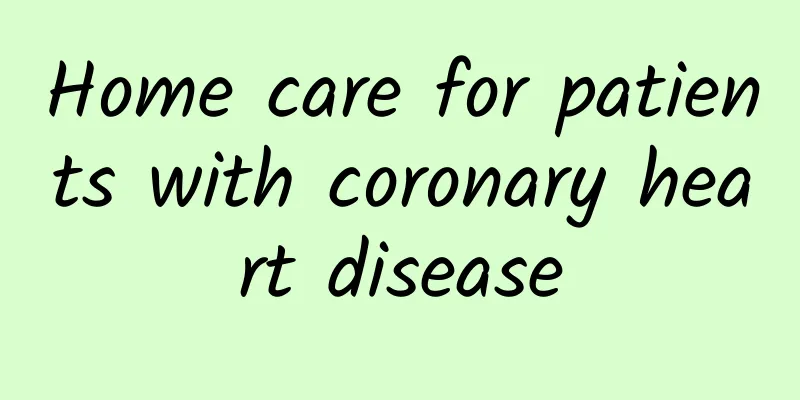Home care for patients with coronary heart disease

|
1. Lifestyle 1. Have a healthy schedule Ensure adequate sleep, preferably about 7-8 hours a day. Avoid staying up late and overwork, and develop regular work and rest habits. Taking a proper nap of 30 minutes to 1 hour at noon can help relieve fatigue. 2. Moderate exercise Choose appropriate forms of exercise, such as walking, Tai Chi, yoga and other low-intensity exercises. Avoid strenuous and competitive sports. The intensity of exercise should be moderate, not causing chest tightness, chest pain, palpitations and other discomfort symptoms. The exercise time can be gradually increased to about 30 minutes each time, 3-5 times a week. 3. Dietary adjustments Control your food intake and avoid overeating. Follow the principle of eating small and frequent meals to reduce the burden on your heart. A low-salt diet with a daily salt intake of no more than 6 grams. Reduce the intake of high-salt foods such as preserved foods and processed meats. Low-fat diet, reduce the intake of high-fat foods such as animal fat and fried foods. Increase the intake of foods rich in unsaturated fatty acids such as fish, beans, and nuts. Eat more fresh vegetables and fruits to ensure adequate daily intake of dietary fiber, vitamins and minerals. 2. Disease monitoring 1. Symptom observation Pay attention to whether there are chest pain, chest tightness, palpitations, shortness of breath and other symptoms. Record the time, frequency, degree and inducing factors of the symptoms. If symptoms worsen, persist, or are accompanied by symptoms such as difficulty breathing, dizziness, sweating, etc., seek medical attention immediately. 2. Measure vital signs regularly Measure blood pressure and heart rate regularly to understand changes in the condition. Blood pressure should be controlled below 140/90 mmHg and heart rate should be maintained at 60 - 100 beats/minute. If there are abnormal fluctuations in blood pressure or heart rate, you should seek medical attention promptly to adjust your treatment plan. 3. Psychological care 1. Maintain a positive attitude Patients with coronary heart disease should maintain an optimistic and positive attitude and avoid negative emotions such as tension, anxiety, and depression. You can relieve psychological stress by listening to music, reading, and communicating with family and friends. 2. Family support Family members should give care and support to patients, encourage them to actively cooperate with treatment, and avoid showing excessive worry or nervousness in front of patients, so as not to affect their mood. IV. First aid measures 1. Always have emergency medicines First aid medicines such as nitroglycerin and quick-acting heart-saving pills should always be available in the home and placed where patients can easily access them. Patients and their families should be familiar with the usage and precautions of emergency medicines. 2. Emergency treatment If the patient has chest pain, chest tightness and other symptoms, he should stop the activity immediately and rest on the spot. Let the patient take nitroglycerin or quick-acting heart-saving pills sublingually. If symptoms persist, call 120 immediately for emergency assistance and closely monitor the patient's condition while waiting for emergency personnel. Article author: Huang Yaru Author unit: Zhangzhou Second Traditional Chinese Medicine Hospital |
<<: How many stomach care misunderstandings have you encountered?
>>: Are children's respiratory diseases at high risk again? Expert response →
Recommend
5-year-old girl had a tooth extracted and suffered brain death due to severe bleeding! Before having a tooth extracted, you must know these things!
Many people know that tooth extraction has risks....
Can phv16 positive be cured?
HPV16 positive in women is highly contagious. Thi...
Can ectopic pregnancy cause stomach pain?
Ectopic pregnancy does not mean that the baby in ...
Don't underestimate high blood pressure. If it is not well controlled, even the thickest arteries of the heart will be torn.
▌The popular science theme of this article comes ...
What should I do if my vagina is swollen, painful, itchy and has excessive vaginal discharge?
In our lives, diseases will never stop, especiall...
Is there any harm if a cat is not sterilized or bred? How long does it take for a cat to be bred?
Many people who keep cats and dogs will send thei...
How long does it take to get your period after an abortion?
Many times, when we have little energy, time, or ...
How many days of delayed menstruation can detect pregnancy
Expectant mothers are very hopeful when their chi...
What to check at 15 weeks of pregnancy
The 15th week of pregnancy is in the early stage ...
Why do some people always feel distant from others? Is a person who feels distant good or bad?
Many people may find that there is a type of pers...
What is the silicone used for breast augmentation like? Does it have any impact on human health?
Silicone breast augmentation is a popular breast ...
Can a woman's blood test reveal her pregnancy?
Before a woman is ready to conceive, both husband...
Baby girl fetal sac
The gestational sac is the initial embryonic tiss...
What to do if the vulva itches in hot weather
Vulvar itching is a very troublesome problem for ...









